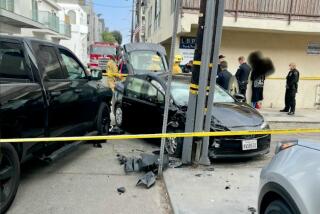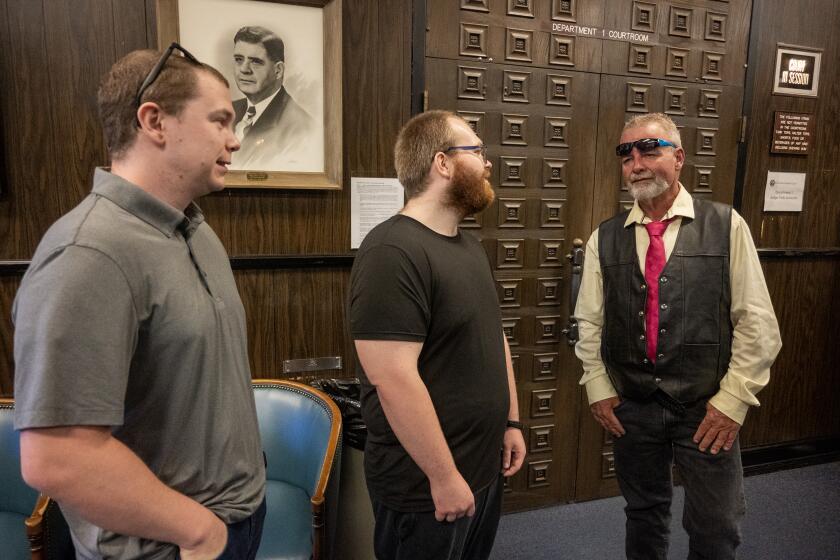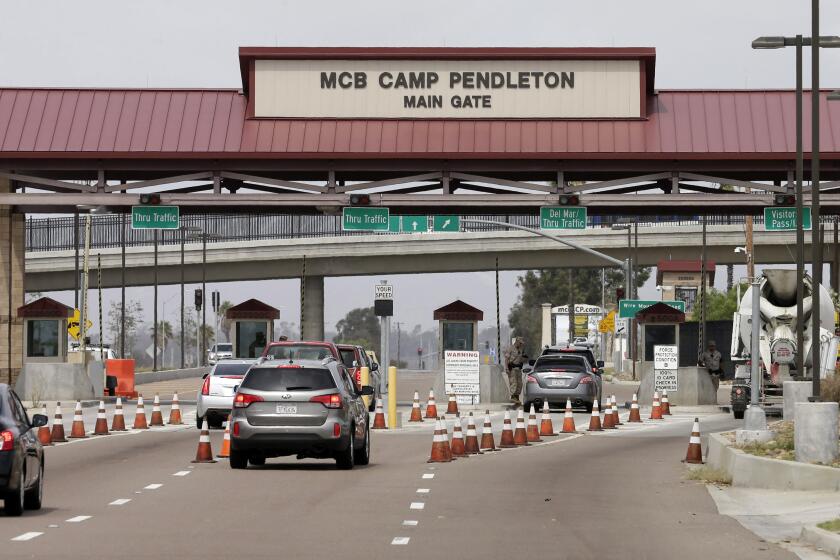Jury Votes Death for Kraft in Killings of 16 Young Men
Randy Steven Kraft, a 44-year-old computer genius portrayed by prosecutors as perhaps the most prolific serial killer in the country, was condemned to death by a jury Friday for the gruesome murders of 16 young men in Orange County.
Kraft sat with his hands folded, tapping his thumbs together, as he heard the death verdict. He whispered to one of his attorneys to have the 10 women and two men on the jury polled individually about their verdict.
The jurors, who had listened to the sometimes-grisly testimony since last September in Orange County Superior Court, said afterward that the choice between death and life in prison without parole--their only options--was clear.
“He should die for what he did to all these people,” said juror Carol Neal, 33, of Tustin, outside the courtroom later. “I’ve had nightmares thinking about the horror of what this man has done.”
“I’m never going to be normal again,” juror Debora Garcia, 31, of Anaheim said. “I was naive about so many things.”
On May 12, the jury convicted Kraft of all 16 murders presented to them. But during the penalty phase, prosecutors introduced eight more murders in Oregon and Michigan.
Authorities have linked Kraft to 45 murders altogether. But they say the numbers could be much greater, based on a coded list with 61 entries that Kraft carried in his briefcase.
Orange County Deputy Dist. Atty. Bryan F. Brown had told jurors that Kraft’s arrest was “an end of an era of Mr. Kraft flying freeways, murdering and dehumanizing people” over a dozen years.
Law enforcement officials believe Kraft would pick up hitchhikers, ply them with alcohol and drugs and then overpower them when they were too weak to resist. The victims’ own shoelaces would be used to bind their wrists; many were strangled with their own belts, emasculated or mutilated with cigarette lighters. The bodies were dumped along freeway ramps or in remote areas.
Superior Court Judge Donald A. McCartin set a tentative sentencing date of Oct. 27. But Kraft’s lawyers said they did not think they could be ready by then.
Lawyers and judges involved in the case say it could be more than a decade before Kraft’s legal appeals are exhausted. If the appeals fail, he would be executed in the gas chamber at San Quentin Prison.
Kraft, a computer consultant from Long Beach, was arrested at 1 a.m. on May 14, 1983, when two California Highway Patrol officers stopped him for weaving across a lane on the I-5 Freeway in Mission Viejo. They found a 25-year-old dead Marine in the front passenger seat of his car.
Orange County Sheriff’s Department investigators quickly linked Kraft to more than a dozen murders, based on evidence found in his car and his home: Pictures of some victims in death and in clothes they had worn when last seen, personal items belonging to some of the victims and the list in the briefcase that had coded items such as “New Year’s Eve,” “Marine Carson,” “2 in 1 Beach.”
Kraft’s lawyers put on more than 50 character witnesses at his death penalty hearing. They described Kraft as caring, loving and extremely bright.
Carol Barnett, an elderly computer programmer proudly described herself as one of Kraft’s proteges. It was Kraft, she said, who recognized that she was being discriminated against at the company where they both worked because of her age. Barnett said Kraft went out of his way to help her learn about computers.
“He didn’t shun me aside like some of the others,” she told the jurors.
But prosecutor Brown suggested to jurors that Kraft was a man with a mask. He wore the mask when at work or with family and friends. But on his nighttime excursions hunting for hitchhikers, Brown said, “we got to see what Randy Kraft was really all about.”
Kraft’s lawyers had asked for the 16 cases to be split into a number of trials, saying it was impossible to get a fair trial otherwise. Judge McCartin refused.
“Once we lost that, it was all over,” defense attorney William J. Kopeny said. “Even the penalty phase was a foregone conclusion.”
More to Read
Start your day right
Sign up for Essential California for news, features and recommendations from the L.A. Times and beyond in your inbox six days a week.
You may occasionally receive promotional content from the Los Angeles Times.






